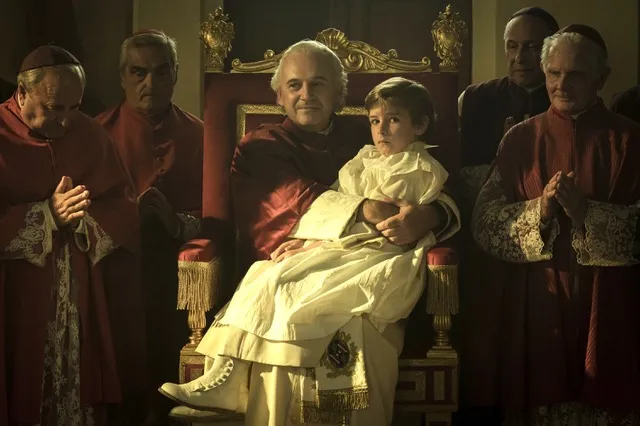
Film Review: Kidnapped: The Abduction of Edgardo Mortara
Film
Kidnapped: The Abduction of Edgardo Mortara
Director: Marco Bellocchio
IBC Movie, Kavac Film and Match Factory Productions
In Theaters: 06.07
As Mark Twain said, “Truth is stranger than fiction, because fiction is obliged to stick to possibilities. Truth isn’t.” The story at the heart of Kidnapped: The Abduction of Edgardo Mortara seems morally and practically impossible, or at the very least unthinkable. Unfortunately, it happened only a little more than a century ago, and the implications are still disturbingly relevant today.
In 1858, in the Jewish quarter of Bologna, Italy – a state governed by the papacy – Salomone Mortara (Fausto Russo Alesi, The Traitor) and his wife, Marianna (Barbara Ronchi, Sweet Dreams) find their home invaded in the middle of the night by the Pope’s soldiers, and their children awakened from their slumber. The men forcibly take custody of Edgardo (Enea Sala), the family’s six-year-old son, on the grounds that a secret baptism performed by his nurse during infancy had made him, by law, a Catholic, and he must therefore be raised as Catholic by a Catholic family. The devastated parents vow to do anything to reclaim their child, and they reach out to the local and even international Jewish community, who stand in solidarity against this horrific injustice. The fight quickly gains serious political momentum. Pope Pius IX (Paolo Pierobon, Up & Down, Palazina Laff) and the Church remain stalwart in their authority on the matter, and over the course of more than a decade, young Edgardo is indoctrinated in the religion. When he grows into a young man (now played by Leonardo Maltese, Lord of the Ants), he joins the Priesthood, even as the struggle between the papacy and the movement for democracy and Italian unification reaches a boiling point.
Director Marco Bellocchio (Fists in the Pocket, The Traitor) approaches the material with a sense of urgency, capturing the setting and the period beautifully through the gorgeous cinematography by Francesco Di Giacomo (The Red Violin) and painstaking production design by Andrea Castorina (Marx Can Wait) while letting the grounded and relatable performances give it a timelessness that is truly haunting. The story was being developed at one point as a major Hollywood production with Steven Spielberg set to direct, and while it’s an important enough story that I’d like to see it reach the kind of wide audience that would have granted it, Bellochio’s deft hand so skillfully guides the film that it would be a tough act for even Spielberg to follow. It’s easy to categorize Kidnapped as a straightforward indictment of abuse of power by the Catholic Church, as well as a testament to the horrors of antisemitism. While these themes are certainly present, at the heart of the story is the issue of religious overreach and the inherent danger of any society whose laws are governed by theocracy rather than democracy. Simply put, all of the major players in this scenario believe that they have the moral high ground and are doing what’s right, but the quest to save a soul according to one belief system is objectively destroying multiple lives in the real world. Whether little Edgardo is a Jew or a Catholic shouldn’t even factor into it: he’s a child being raised by a capable and loving family.
Alesi gives a powerful and deeply human performance as Salomone, an anguished father who must learn to try to temper his anger at this violation of decency in order to seek any diplomatic solution short of converting to Catholicism, which is the only one that the Vatican will endorse. The pain behind Alesi’s eyes masterfully expresses more than dialogue ever could, and it’s heartbreaking to watch. Ronchi, as the distraught mother who will never accept that enough is being done until her child is back in her arms, is mesmerizing, and young Sala is unforgettable as Edgardo, a confused and good-hearted child who takes the word of the those who say they are acting in his best interest at face value because he’s too innocent and helpless to do anything else. Pierobon is perhaps the standout as Pope Pius, resisting the urge to play the character as a saint or as one dimensional villain. There’s both a deviousness and a “holier than thou” arrogance to the characterization, yet it’s ultimately rooted in the same place as Edgardo’s when he joins the Priesthood. It’s what he’s been taught to follow unwaveringly since as long as he can remember.
Kidnapped: The Abduction of Edgardo Mortara is a spellbinding and deeply unsettling film, and it’s piercingly relevant in time when the answer to whose actions are justified and what constitutes a righteous society is too often dictated by unbending dogma, and the loudest among us are issuing a battle cry to go even further in that direction. This is an important and profound film that needs to be widely seen, digested and discussed openly and mindfully. –Patrick Gibbs
Read more from the cabinet of Patrick Gibbs:
Bad Boys: Ride Or Die
Director Castille Landon Talks Summer Camp
